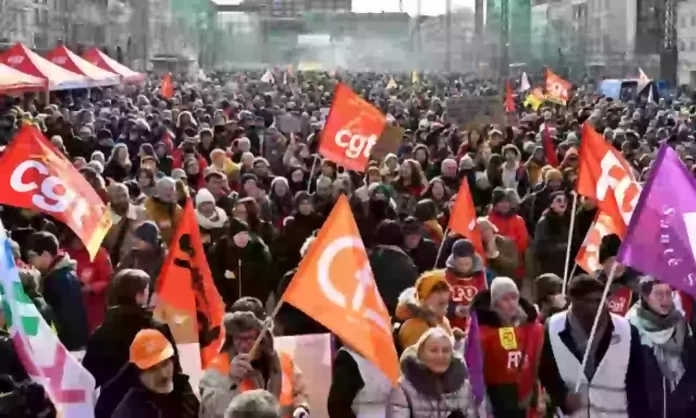
Workers across the world are rising in a global strike wave, in response to the cost-of-living crisis, which is making nonsense of their wages. In several European countries, trade unions went on some of their biggest strikes in decades at the end of January/beginning of February.
In Britain, more than half a million workers walked from work on 1 February. The unions that organised the strike covered several sectors. Thus, schools were shut down, transportation disrupted and skeletal services only provided in health facilities.
Their demands were for improved pay and working conditions. Workers’ real wages had taken a battering from the 2007-9 global economic crisis. And they are now being further eroded by the worst inflation witnessed in four decades, with consumer product inflation rate at 16.7% by the third week of January.
There have been a series of strikes and mass demonstrations in France since the beginning of the year. In mid-January, around 700,000 workers marched across several cities in the country. These included health workers, firefighters, teachers, grocery workers and oil workers. Radical civil society groups joined the protest marches.
The main grouse of the workers was the French government’s raising of the retirement age from 63 to 64 years. But the fightback was also building on the massive strikes for pay rise last year. The spirit of solidarity was also expressed in definitive ways. For example, the energy sector workers threatened to cut off power supply to the rich, while providing cheap or free energy to working-class communities.
In Sudan, university teachers commenced an indefinite strike on 10 January, shutting down academic activities in the country’s 36 universities. The lecturers were protesting the non-inclusion of a negotiated new salary structure for them in the 2023 budget.
The University of Botswana Academic and Support Staff Union (UBASSU) and University of Botswana Staff Union (UBSU) also called out their members on strike in the first week of February. The unions declared a dispute over the 2022-2023 salary increment negotiated with the government, after handing over a petition to the Minister of Education and Skills, Dr Douglass Letsholathebe, in November, demanding a 15% salary increase with effect from April 2022, or 7.5% salary increase plus enhanced allowances.
Ghana’s education sector also had its strike moment in the last quarter of 2022. The University Teachers Association of Ghana (UTAG),Ghana Association of University Administrators (GAUA), Federation of University Senior Staff Association of Ghana (FUSSAG), and Tertiary Education Workers Union (TEWU) were on strike from 17 October to 14 December for pay rise and improved working conditions.
This strike wave might be the beginning of a long drawn post-COVID-19 era struggle. At least 83 countries have already commenced implementation of austerity measures worldwide. The capitalists and their governments want to make the working class to bear the cost of the crisis of their system.
We need to reinforce solidarity across sectors and countries. But we also need to have a vision which ties the struggles for pay increases and improved working conditions with the need to overthrow the capitalist system, which is wired to sustain our exploitation and suffering.
by Baba AYE








